Home Tags Posts tagged with "muslim brotherhood"
muslim brotherhood
Mohamed Morsi is to stand trial on charges including conspiring with foreign organizations to commit terrorist acts.
Prosecutors said Egypt’s ousted president had formed an alliance with the Palestinian militant group Hamas and Lebanon’s Hezbollah.
Thirty-five others, including former aides and leaders of the Muslim Brotherhood, have also been charged.
Since being deposed by the military in July, Mohamed Morsi has already gone on trial for inciting murder and violence.
The new charges carry the death penalty. Prosecutors describe the new charges as “the biggest case of conspiracy in the country’s history”.
Human rights organizations have expressed concern over whether Mohamed Morsi will be able to get a fair trial.
Mohamed Morsi’s supporters say the prosecutions are politically motivated, something the military-backed government denies.
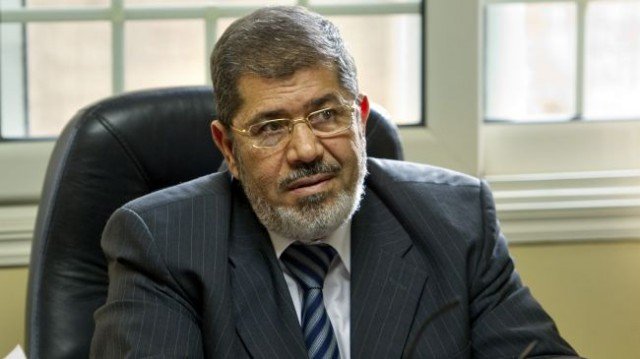
Mohamed Morsi is to stand trial on charges including conspiring with foreign organizations to commit terrorist acts
He is one of thousands of Brotherhood members to have been detained in a crackdown portrayed by officials as a struggle against terrorism.
Hundreds of people have also been killed in clashes with security forces.
Mohamed Morsi and the other defendants, including the Brotherhood’s general guide Mohammed Badie and his two deputies, have now been charged with revealing state secrets to foreign organizations, sponsoring terrorism, and carrying out military training and other acts that undermined Egypt’s stability and independence.
Prosecutors allege that the Brotherhood had prepared a “terrorist plan” that included an alliance with Hamas, the Islamist group that governs Gaza, and Hezbollah, a powerful Lebanese Shia Islamist movement.
Several of the defendants, including Mohamed Morsi’s former chief of staff Essam Haddad, were also reportedly accused of giving state secrets to Iran’s Revolutionary Guards.
The prosecutors also implicated the Brotherhood in the surge in attacks on the security forces since Mohamed Morsi’s overthrow, most of which have taken place in the Sinai peninsula and been claimed by jihadist militants.
The violence was intended to “bring back the deposed president and to bring Egypt back into the Muslim Brotherhood’s grip”, they claimed.
Last month, Mohamed Morsi went on trial on charges of incitement in connection with clashes between his supporters and opposition protesters outside the Ittihadiya presidential palace in Cairo in December 2012, in which at least seven people died.
Proceedings have been adjourned until January 8th, but Mohamed Morsi will also go on trial on December 23rd on separate fraud charges connected with the Brotherhood’s economic and social programme for Egypt’s recovery, called Renaissance (al-Nahda).
Egypt’s Muslim Brotherhood leader Mohammed Badie has appeared in court for the first time since his arrest in August.
Mohammed Badie was seized along with other Brotherhood figures after the Egyptian army ousted Islamist President Mohamed Morsi in July.
Hundreds of Mohamed Morsi’s supporters were killed in clashes following the ousting.
Mohammed Badie, who is the movement’s General Guide, denied the Brotherhood had acted violently.
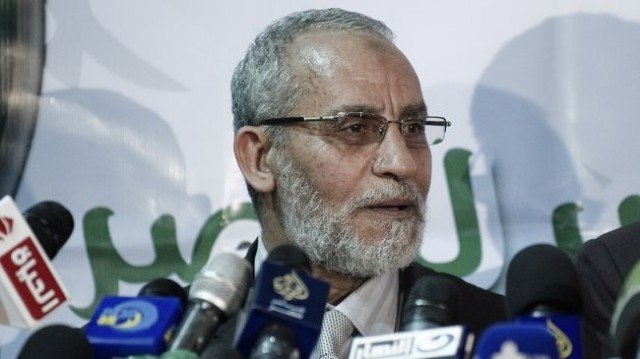
Muslim Brotherhood leader Mohammed Badie has appeared in court for the first time since his arrest in August
He is facing charges of inciting violence and murder over the deaths of eight anti-Brotherhood protesters outside the movement’s headquarters in Cairo.
Mohammed Badie was in court in Cairo along with other Brotherhood figures.
He asked why the death of his son and the burning down of Brotherhood offices were not being investigated instead.
Mohammed Badie was a prominent figure at the Brotherhood’s protest camps in Cairo, but went into hiding as the military-backed interim government increased its efforts to shut down the protests.
His 38-year-old son Ammar was killed in the protests.
In a separate case, Egyptian prosecutors referred the secular activist Alaa Abdel Fattah and 24 others for trial.
They are accused of breaking Egypt’s new laws against protests by demonstrating without permission last month.
[youtube RCTSlBUib1M 650]
Egypt’s ousted President Mohamed Morsi has arrived in court in Cairo where he is due to go on trial, state media say.
Mohamed Morsi and 14 other Muslim Brotherhood figures face charges of inciting the killing of protesters in clashes outside the presidential palace.
Security services are on high alert after supporters of the former president called for major protests.
Mohamed Morsi was ousted by the military in July after protests against his rule.
According to state TV, Mohamed Morsi arrived at the courtroom, inside the Police Academy in Cairo. Other key Brotherhood figures, Essam el-Erian, Mohammed al-Beltagi and Ahmed Abdel Aati are also there.
While Mohamed Morsi was airlifted into the compound by helicopter, other defendants were said to have been brought in by armoured personnel carriers.
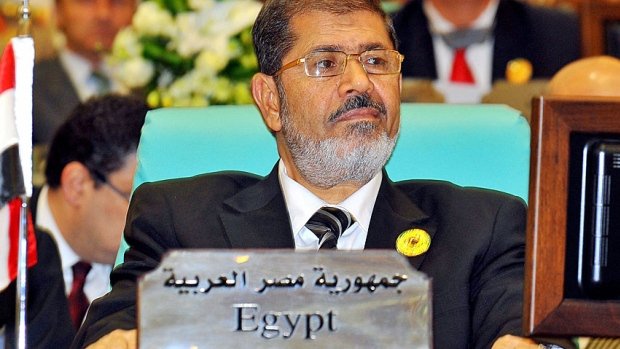
Mohamed Morsi and 14 other Muslim Brotherhood figures face charges of inciting the killing of protesters in clashes outside the presidential palace
The ousted president was seen from a distance in civilian clothes, Egyptian radio reported. This is his first appearance in public since he was ousted on July 3.
The trial had been due to take place at Tora prison on the other side of Cairo but had been switched late on Sunday, apparently to deter protesters.
Shortly after Mohamed Morsi’s arrival, a small crowd arrived and began chanting outside the sprawling police compound more than one hour’s drive from the centre of the city. The crowd soon grew to number some 200.
Although Mohamed Morsi won the presidency in a democratic election, during his 13 months in power he fell out with key institutions.
The ex-president is accused of “incitement to murder and violence” over the deaths of at least 10 people during intense clashes in December 2012 which followed a decree that gave him wide-ranging powers.
After he was ousted, a sit-in protest in Cairo by Mohamed Morsi’s supporters was violently broken up by the military, leading to the deaths of hundreds of people.
The interim government has also cracked down on the Muslim Brotherhood, from which Mohamed Morsi hails, banning the Islamist organization and arresting dozens of senior figures.
His supporters say he was removed in a coup and is now facing a politicized trial. Human rights groups accuse the security services of acting without accountability.
Mohamed Morsi and his co-defendants are expected to use the trial to underline what they see as the illegitimacy of their ousting. There is considerable interest in Egypt in whether the authorities decide to televise the former leader’s appearance in court.
[youtube X8z8nOTgVzw 650]
[youtube noKK_X8PPqY 650]
Judge Mahmoud el-Rachidi has ordered a media blackout during the next phase of the retrial of Egypt’s former leader Hosni Mubarak.
Judge Mahmoud el-Rachidi said the sessions, to be held on October 19-21, would involve national security issues.
Hosni Mubarak, 85, appeared in court on charges of complicity in the killing of protesters during the 2011 uprising.
Defense lawyers are seeking to blame Islamists from the Muslim Brotherhood and foreign forces for the deaths of about 850 people killed in the unrest.
Hosni Mubarak was jailed for life in June last year for contributing to the killings.
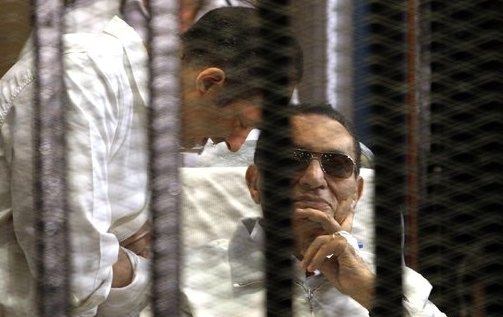
Hosni Mubarak appeared in court on charges of complicity in the killing of protesters during the 2011 uprising
But he appealed against his sentence and a retrial was ordered.
Hosni Mubarak is on trial along with his two sons, the former interior minister, and six security chiefs.
Certain parts of his original trial were also held behind closed doors.
Judge Mahmoud el-Rachidi had promised more transparency with the retrial.
However, the judge said on Saturday that all journalists would be barred from the next hearings and forbidden from quoting lawyers.
“This decision does not go against my previous promise to the media, because I had announced from the start that the people will know about everything, except for proceedings of hearings, in order for us to allow the witness to testify,” he said.
The interior minister’s lawyer said the people called to testify had information on who killed the protesters, and “which foreign factions joined forces with the Muslim Brotherhood in the events of the 28 January [2011] to cause chaos and the killing of protesters”.
Muslim Brotherhood’s candidate Mohamed Morsi won Egypt’s first free election last year, but was eventually overthrown by the military after widespread protests.
Hosni Mubarak was freed from custody shortly after the overthrow, and placed under house arrest.
During Hosni Mubarak’s 29-year rule the Muslim Brotherhood was outlawed.
[youtube M7xZI3zisGQ]
Egypt’s new government has decided to press ahead with the legal dissolution of the Muslim Brotherhood, state media report.
A spokesman for the social solidarity ministry said it would revoke the Islamist movement’s non-governmental organization status “within days”.
The Muslim Brotherhood had failed to respond to allegations of forming militia and illegal activities, he added.
The military authorities have launched a crackdown on the group since ousting President Mohamed Morsi on July 3.

Egypt’s new government has decided to press ahead with the legal dissolution of the Muslim Brotherhood
Dozens of senior figures, including its general guide Mohammed Badie, have been detained over allegations of inciting violence and murder.
Hundreds of people demanding Mohamed Morsi’s reinstatement, most of them Muslim Brotherhood members, have also been killed in clashes with security forces, who portray the crackdown as a struggle against “terrorism”.
The 85-year-old Islamist movement was banned by Egypt’s military rulers in 1954, but registered itself as an NGO in March in response to a court case bought by opponents who contested its legal status.
The Muslim Brotherhood also has a legally registered political wing, the Freedom and Justice Party, which was set up in June 2011 as a “non-theocratic” group after the uprising that forced President Hosni Mubarak from power.
[youtube yQebBLNdkIc]
Eleven supporters of ousted President Mohamed Morsi have been sentenced to life in prison after being convicted of attacking the Egyptian army.
The men were accused of wounding soldiers, sabotaging armored vehicles and burning churches during riots in the port city of Suez last month.
Forty-five others received five-year sentences, while five were acquitted.
The riots followed a deadly crackdown by security forces on two pro-Morsi protest camps in the capital, Cairo.
Hundreds of people, mostly members of Mohamed Morsi’s Muslim Brotherhood, were killed when the sit-ins outside the Rabaa al-Adawiya mosque and at Nahda Square were cleared on August 14.
The unrest in Suez, 87 miles to the east of Cairo, on August 14 and 16 left more than 30 dead.
It is not clear if those convicted on Tuesday are Brotherhood members. But if they are, the verdicts would be the first affecting the Islamist group since the military launched a campaign against it after ousting Mohamed Morsi.
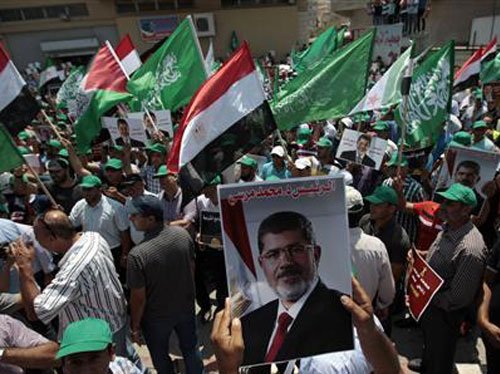
Eleven supporters of ousted President Mohamed Morsi have been sentenced to life in prison after being convicted of attacking the Egyptian army
State prosecutors announced on 1 September that after almost two months in detention at a secret location, Mohamed Morsi would stand trial for inciting murder and violence.
The charges relates to the deaths of at least seven people during clashes between opposition protesters and Brotherhood supporters outside the Ittihadiya presidential palace in Cairo in December 2012.
Fourteen other senior Muslim Brotherhood figures, including Mohammed al-Beltagi and Essam al-Erian, will be tried on the same charge.
Also on Tuesday, a court in Cairo ordered the closure of four television stations, including the Brotherhood’s Ahrar 25 TV and al-Jazeera’s Egyptian affiliate Mubasher Misr, saying they were operating illegally.
The stations were seen by the authorities as being sympathetic to the Brotherhood.
The group called for protests demanding the reinstatement of Mohamed Morsi in the capital on Tuesday under the slogan: “The coup is terrorism.”
The state news agency, Mena, said security forces had sealed off some roads in the capital. Military vehicles were reported to be blocking the entrances to the Rabaa al-Adawiya mosque and Tahrir Square, the centre of the anti-government protests which triggered the Egyptian revolution in 2011.
The resumption of national rail services after 17 days was also delayed.
[youtube Pad9uVHRkW0]
Egypt’s state prosecutor announces he has referred ousted President Mohamed Morsi for trial on charges of inciting the murder of protesters.
The accusations relate to violence outside the presidential palace in Cairo last December when at least seven people were killed in clashes.
Fourteen other members of the Muslim Brotherhood are to stand trial on the same charges.
Mohamed Morsi has been held at a secret location since he was deposed in July.
He faces a number of charges but this case is his first referral for trial.
Since he was ousted from power, the military-backed interim government has cracked down on Brotherhood supporters, who are demanding Mohamed Morsi’s reinstatement.
Last month, hundreds of protesters died when security forces stormed pro-Morsi camps in the capital.
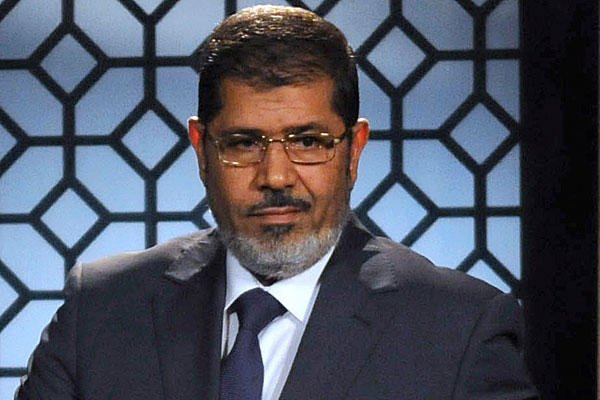
Egypt’s state prosecutor announces he has referred ousted President Mohamed Morsi for trial on charges of inciting the murder of protesters
The state prosecutor referred the former president for trial late on Sunday, Egypt’s state media reported.
They said he would go on trial on charges of “incitement to murder and violence” in December 2012.
The date for the trial is yet to be announced.
The case relates to clashes outside the presidential palace in early December 2012.
Tens of thousands of demonstrators had rallied outside the building on the night of 4 December and the following day in protest at what they described as Mohamed Morsi’s illegal decrees giving him sweeping powers and also his drive to change the country’s constitution.
On Sunday, state media said an investigation revealed that Mohamed Morsi had asked the Republican Guard and the minister in charge of police to break up the protesters’ sit-in, but they had refused to obey the order.
Mohamed Morsi’s aides are then alleged to have called their supporters to deal with the demonstrators.
At least seven people died in the clashes and hundreds more were injured.
Mohamed Morsi’s supporters say they were defending the palace after being attacked by opposition activists.
Among the other 14 suspects due to go on trial with the ousted president are leading figures in the Brotherhood’s political wing, Mohammed al-Beltagi and Essam El-Erian.
Mohamed Morsi has previously been accused of the “premeditated murder of some prisoners, officers and soldiers” when he and several Muslim Brotherhood leaders were freed during a breakout at a Cairo prison in January 2011.
Mohamed Morsi is also alleged to have plotted attacks on jails in the uprising that overthrew President Hosni Mubarak and of conspiring with the Palestinian militant group Hamas.
[youtube W-xDNb2-Dw8]
Hosni Mubarak has appeared in court, three days after being released from prison and placed under house arrest.
The former Egyptian president is facing a retrial on charges of complicity in the killing of protesters during the 2011 uprising.
Hosni Mubarak sat in the defendants’ cage along with his two sons, former interior minister, and six security chiefs.
Earlier, the separate trial of the Muslim Brotherhood’s general guide and his two deputies was adjourned.
The court convened briefly and made its decision because Mohammed Badie, Khairat al-Shater and Rashad Bayoumi were absent for security reasons.
Their presence was requested for the trial’s resumption on October 29.
The Brotherhood leaders face charges of inciting the murder of protesters who stormed the Islamist movement’s headquarters in Cairo on 30 June as millions took to the streets demanding the resignation of Hosni Mubarak’s democratically elected successor, Mohamed Morsi.
Mohamed Morsi was deposed by the military three days later.

Hosni Mubarak has appeared in court, three days after being released from prison and placed under house arrest
He is being detained while prosecutors investigate allegations related to his escape from prison during the uprising that forced Hosni Mubarak from power, including that he conspired with the Palestinian militant group Hamas.
On Sunday, Hosni Mubarak, 85, appeared in the dock inside the high-security courtroom at the police academy on the eastern outskirts of Cairo sitting in a wheelchair, wearing a white tracksuit and dark sunglasses.
He was reportedly flown by helicopter to the court from a military hospital where he has been held under house arrest since his release from prison on Thursday. The hearing has been adjourned until September 14.
Hosni Mubarak was sentenced to life in prison in June 2012 after being found guilty of complicity in the killing of hundreds of protesters. His former interior minister, Habib al-Adly, also received a life sentence, but the security chiefs were acquitted.
The former president and his sons, Alaa and Gamal, were cleared of separate charges of corruption relating to a gas export deal at the same trial because of the statute of limitations.
In January 2013, the Court of Cassation accepted appeals against their convictions by Hosni Mubarak and Habib al-Adly and ordered a retrial of all the defendants. Their supporters had noted that the original trial judge had said there was no evidence linking Hosni Mubarak to the shooting of protesters.
Their retrial began in May but it has been repeatedly adjourned for various reasons, prompting claims from pro-democracy activists and representatives of the victims that the judges and defense team were dragging out proceedings to avoid a verdict.
On Thursday, Hosni Mubarak was moved from a prison cell to house arrest at the hospital in Maadi, ending more than two years of incarceration.
It came a day after a court ruled that he could no longer be detained in relation to a separate corruption case that alleges he accepted gifts from the state-run publisher, al-Ahram. He has already served the maximum time allowed in custody in connection to the complicity case.
Under President Mohamed Morsi, state prosecutors brought new charges when courts ordered Hosni Mubarak’s release to ensure he was kept in detention. Alaa and Gamal Mubarak are being held on multiple corruption charges.
[youtube QD8vE76Cq84]
Hosni Mubarak has been released from Cairo prison after appealing against his detention.
The former Egyptian president was flown out of Tora prison by helicopter to a hospital, but is now expected to be put under house arrest.
Hosni Mubarak, 85, still faces charges of corruption and complicity in the killing of demonstrators during the protests that toppled him in 2011.
His release is seen by many as a sign that the military is rolling back the changes that flowed from the uprising.
Egypt is currently under a state of emergency amid the bloodshed which has accompanied the army-backed interim government’s crackdown on Islamists opposed to the army’s ousting of Islamist President Mohamed Morsi on 3 July.
Hundreds of members of the Muslim Brotherhood – the movement from which Mohamed Morsi comes – have been detained, including its most senior leader Mohammed Badie, who was wanted over alleged incitement to violence and murder.
On Thursday, the medical helicopter arrived at Tora, as dozens of Hosni Mubarak supporters – some waving flags – gathered outside the prison.
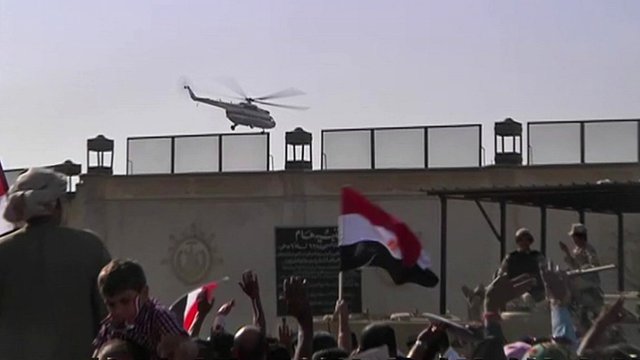
Hosni Mubarak has been released from Cairo prison after appealing against his detention
Egypt’s TV channel then showed the helicopter transferring Hosni Mubarak to a military hospital in the capital. The ex-leader was seen being transferred from the aircraft into an ambulance outside the hospital, amid heavy security.
This comes after a court ruled on Wednesday that the former leader must be released in a corruption case.
The ruling came during the hearing on charges that the former president had accepted gifts from state-run publisher al-Ahram. The value of the gifts has since been repaid.
The court said its decision was final and no appeal would be allowed.
Prosecutors have previously brought new charges when courts have ordered Hosni Mubarak’s release – a move intended to keep the ailing ex-leader in detention.
But shortly after the court ruling, the office of PM Hazem el-Beblawi said Hosni Mubarak would be placed under house arrest after his release.
“In the context of the emergency law, the deputy military commander issued an order that Hosni Mubarak should be put under house arrest,” the office said in a statement.
Hosni Mubarak was sentenced to life in jail last year for complicity in the killing of demonstrators, but a retrial was later ordered after his appeal was upheld.
That retrial opened in May but Hosni Mubarak has now served the maximum amount of pre-trial detention permitted in the case.
European Union foreign ministers on Wednesday agreed to stop export licenses on military equipment to Egypt and to reassess security co-operation in response to the clampdown.
[youtube fFeDFIAvdb0]
Former Egyptian President Hosni Mubarak will be freed after a Cairo court ruled his release on bail in a corruption case.
Reports from Cairo suggest Hosni Mubarak may be freed from prison on Thursday, but the prosecution may still appeal.
Hosni Mubarak, 85, still faces charges of complicity in the killing of protesters during the uprising that forced him from power in 2011.
The former leader was sentenced to life in jail last year, but a retrial was later ordered after his appeal was upheld.
That retrial opened in May but Hosni Mubarak has now served the maximum amount of pre-trial detention permitted in the case.
On Wednesday, the court in the capital ordered the release of Hosni Mubarak, said his lawyer and judicial sources.
Asked when Hosni Mubarak could actually leave the prison, his defense lawyer Fareed El-Deeb told Reuters: “Maybe tomorrow.”
The ruling came during a hearing on charges that the former president had accepted gifts from state-run publisher al-Ahram.
Judge Ahmed el-Bahrawi said, who is overseeing the case, was quoted by Reuters as saying that the ruling “is final and the prosecution cannot appeal against it”.
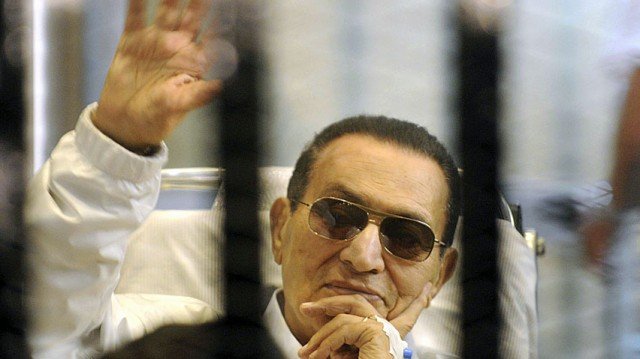
Hosni Mubarak may be freed from prison on Thursday, but the prosecution may still appeal
Prosecutors have previously brought new charges when courts have ordered Hosni Mubarak’s release – a move intended to keep the ailing ex-leader in detention.
Analysts say Hosni Mubarak’s release – if it happens – would be seen by many as a sign the military is rolling back the changes that flowed from the 2011 uprising.
Egypt is under a state of emergency amid the bloodshed which has accompanied the interim government’s crackdown on Islamists opposed to the army’s ousting of Islamist President Mohamed Morsi on July 3.
European Union foreign ministers are currently meeting to determine a response to the clampdown on the Muslim Brotherhood.
Some EU leaders have called for the 28-member bloc’s 5 billion-euro ($6.7 billion) aid package to Egypt to be cut after more than 900 people were killed in clashes last week.
The violence erupted as security forces cleared two sit-ins in Cairo by people demanding the reinstatement of Mohamed Morsi.
However, sources say the EU ministers are likely to consider the military and security support provided by several European nations, and whether there might be a formal suspension of this across the bloc.
The EU’s foreign policy chief, Baroness Catherine Ashton, has offered to mediate a political solution to the crisis and is working on “confidence building measures” between the interim government and Brotherhood.
In Washington, senior officials discussed on Tuesday whether to reduce the $1.3 billion in military aid that the US gives Egypt every year. The meeting reportedly produced no imminent changes to US policy.
[youtube sHXqzYFvmAE]
General Guide Mohammed Badie, the spiritual leader of Egypt’s Muslim Brotherhood, has been arrested in Cairo, officials say.
Reports said Mohammed Badie was detained at a residential flat in Nasr City.
A state of emergency is in force in Egypt amid turmoil following a crackdown on Islamists in which hundreds have died.
Three days of mourning are being held for 25 police killed in Sinai by suspected Islamist militant extremists.
Almost 900 people, including more than 100 police and soldiers, are reported to have been killed in Egypt since Wednesday, when the army cleared protest camps set up by supporters of deposed President Mohamed Morsi, many of them members of the Muslim Brotherhood movement.
On Sunday, 36 Islamist protesters died in a prison van in the capital, Cairo.
Hundreds of members of the Muslim Brotherhood have been detained over recent days.
Mohammed Badie had been on the run as the military-backed interim authorities in Egypt try to suppress protests at the ousting of Mohamed Morsi.
He is facing charges of inciting violence and murder over the killing of eight anti-Brotherhood protesters outside the movement’s headquarters in Cairo last June.
Officials and state media said Mohammed Badie was detained in a flat in Nasr City in north-east Cairo, near the site of one of the protest camps bloodily broken up last week.
Images of Mohammed Badie shortly after his arrest were shown on the private channel ON TV.
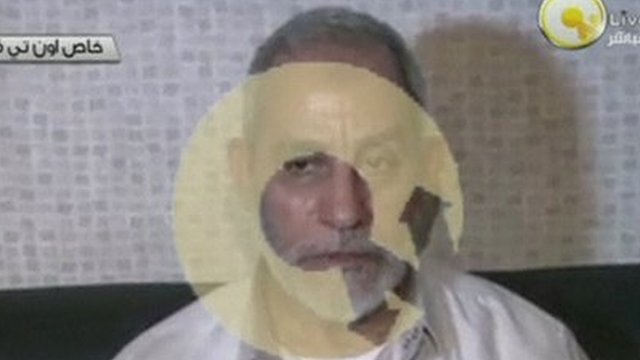
Mohammed Badie, the spiritual leader of Egypt’s Muslim Brotherhood, has been arrested in Cairo
The arrest comes days after Mohammed Badie’s 38-year-old son, Ammar, was shot dead during protests in the capital’s Ramses Square.
Mohammed Badie’s deputy, Khairat al-Shatir, was arrested in the days following Mohamed Morsi’s overthrow.
Correspondents say his detention will further ratchet up tensions in the country, where an indefinite dusk till dawn curfew is in place, a leaves a power vacuum at the top of the Brotherhood movement.
The attack on the Sinai police convoy, close to the town of Rafah on the Gaza border, was one of the deadliest on security forces in several years.
It is not clear who carried out the attack. Sinai is home to a range of militant groups, some of which have links to al-Qaeda.
The off-duty police officers were reportedly ordered to leave the buses before being shot in the back of the head.
State television showed their flag-draped coffins arriving by plane in Cairo.
Egypt’s official media has not connected the killings to the Muslim Brotherhood, but the deaths add to the sense of crisis.
In a separate incident, another police officer was killed in the north Sinai town of el-Arish.
Attacks by Islamist militants on the Egyptian security forces have surged in northern Sinai since 2011 – they have been close to daily in recent weeks.
European Union foreign ministers will meet on Wednesday to decide whether to cut some of the billions of euros in aid pledged to Egypt.
Meanwhile, Egyptian prosecutors have added a further 15 days to ousted President Mohamed Morsi’s detention while they investigate fresh allegations against him.
Mohamed Morsi has reportedly been accused of complicity in acts of violence against protesters outside the presidential palace last December. His detention had already been extended by 30 days in a separate case on Thursday.
Meanwhile, a lawyer for another former leader, Hosni Mubarak, has said he hopes his client could be released from prison within the next two days.
Lawyer Fareed al-Dib said Hosni Mubarak had been cleared of one corruption charge and they were waiting for the court to check whether he still had to be held in custody on other counts.
Hosni Mubarak is facing a retrial for corruption and complicity in the deaths of protesters during the 2011 uprising which ended in his removal from power after 30 years.
While it is still no more than a rumor, analysts say his release would be seen by many Egyptians as a signal that the military is rolling back the changes that flowed from the uprising of 2011.
[youtube i5oXXwwKE0w]
At least 24 Egyptian policemen have been killed in an ambush attack in the Sinai peninsula.
Medical sources and officials said the police were in two buses which came under attack from armed men close to the town of Rafah on the Gaza border.
Three policemen were also reported to have been injured in the blast.
The military recently intensified a crackdown against militants in Sinai, where attacks have surged since the fall of Hosni Mubarak in 2011.
Egyptian deployments in the peninsula are subject to the 1979 peace treaty between Israel and Egypt.
There were conflicting reports about how Monday’s attack unfolded.
Security sources quoted by the Associated Press news agency say four armed men stopped the buses and forced the police to get out before shooting them.
But other reports spoke of rocket-propelled grenades being fired at the buses.
The Rafah border post into Gaza was closed in response to the attack and security increased at checkpoints on the peninsula.
Egypt’s interim, military-backed leaders have declared a state of emergency amid the nationwide unrest which has followed the ousting of Islamist Mohamed Morsi as president on 3 July.
A night-time curfew is in place in the capital, Cairo, and many other provinces.

At least 24 Egyptian policemen have been killed in an ambush attack in the Sinai peninsula
More than 830 people, including 70 police and soldiers, are reported to have been killed since Wednesday, when the army cleared protest camps set up by Mohamed Morsi supporters, many of them members of the Muslim Brotherhood movement.
On Sunday night, 36 Islamists died as they were being transported to a prison outside Cairo.
Government and military officials said they had suffocated in the back of a prison van from the effects of tear gas, which was fired when the prisoners rioted.
But there were other reports of gunfire.
The Brotherhood said the interior ministry had “decided to betray its trust and ignore its role” and had killed the detainees “for their opposition to the bloody military council”.
It said the “heinous crime shows the total disregard of the right to life by these murderous fascist thugs” and raised concerns about the safety of the hundreds of pro-Morsi activists now in detention.
European Union foreign ministers are to hold emergency talks on Wednesday to discuss the situation in Egypt. The date was agreed during preparatory talks by senior diplomats in Brussels on Monday.
European Commission President Jose Manuel Barroso and the president of the European Council Herman Van Rompuy have said the EU “will urgently review in the coming days its relations with Egypt”.
In a joint statement on Sunday, they expressed regret that international efforts to find a peaceful way forward in Egypt were abandoned and a “course of confrontation” instead pursued.
“The calls for democracy and fundamental freedoms from the Egyptian population cannot be disregarded, much less washed away in blood,” they said.
Mohamed Morsi’s supporters say the removal of Egypt’s first freely elected president was a coup.
However the interim government says the Muslim Brotherhood has carried out a campaign of terror since he was overthrown.
The head of the armed forces, Gen Abdul Fattah al-Sisi, has warned the military will not tolerate unrest.
Meanwhile, a lawyer for Hosni Mubarak has said he expects the former leader to be released from prison within the next two days.
However, the legal situation is unclear.
Hosni Mubarak is facing a retrial for corruption and complicity in the deaths of protesters during the 2011 uprising.
[youtube G29zOXhlz3c]
Egypt’s security forces have cleared al-Fath mosque in Cairo after a long stand-off with Muslim Brotherhood supporters barricaded inside, state media says.
All the protesters have now been taken out of the mosque, and many have been arrested, security forces say.
The confrontation at the al-Fath mosque continued for most of the day – with exchanges of gunfire between security forces and protesters.
Meanwhile interim PM Hazem Beblawi has proposed legally dissolving the Brotherhood.
The group supports the ousted President Mohamed Morsi, and wants him to be reinstated.
Despite being closely allied to Mohamed Morsi’s government, the Brotherhood has always technically been a banned organization – it was officially dissolved by Egypt’s military rulers in 1954 – but it recently registered itself as a non-governmental organization.
If it was legally dissolved, its property and assets could be seized.
It has called for daily demonstrations since a crackdown on its protest camps in Cairo on Wednesday left hundreds of people dead. Further clashes on Friday killed at least another 173 people.
Hazem Beblawi believes the protests are “terrorist acts”, according to his spokesman, Sharif Shawqi.
Sharif Shawqi told a televised news conference on Saturday that the Muslim Brotherhood’s return to power was impossible.
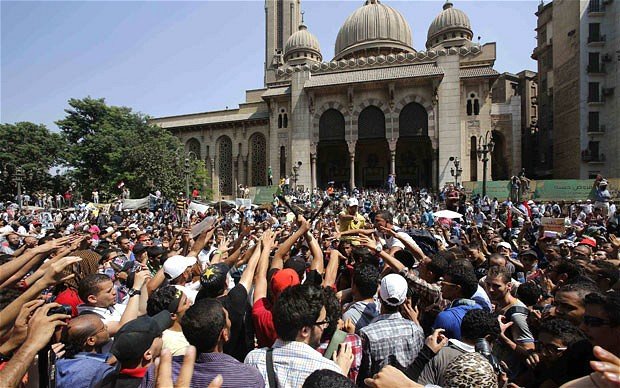
Egypt’s security forces have cleared al-Fath mosque in Cairo after a long stand-off with Muslim Brotherhood supporters barricaded inside
The stand-off began overnight, when the al-Fath mosque – which was being used as a makeshift clinic for the injured and morgue for the dead from clashes on Friday – turned instead into what correspondents describe as a fortress.
Brotherhood members barricading themselves inside, using anything at their disposal.
It turned into a scene of chaos. Tear gas was fired into the building, and witnesses saw live ammunition fired by both sides.
Al-Jazeera television called one woman inside the mosque on her mobile phone as the shooting began.
“Nobody here is safe, they are shooting inside the mosque,” she said, with loud firing heard in the background.
Egyptian police have been bringing some Mohamed Morsi supporters out of the building – leading some, dragging others – but are then having to protect them from angry mobs armed with bats and pieces of wood who are trying to attack them, correspondents say.
The authorities want to secure all buildings to avoid a repeat of Muslim Brotherhood supporters forming more camps, as they did after Mohamed Morsi was ousted.
Separately, the Egyptian authorities say they have arrested the brother of al-Qaeda chief Ayman al-Zawahiri.
Mohammed al-Zawahiri was detained at a checkpoint in Giza, near Cairo, because of his links to Mohamed Morsi, according to security officials.
Also on Saturday, the Muslim Brotherhood said on its Facebook page that Ammar Badie, the son of the movement’s spiritual leader, General Guide Mohamed Badie, was one of those killed during protests on Friday.
The Brotherhood said that Ammar Badie, 38, had died of a bullet wound in Ramses Square on Friday.
The secretary-general of the Brotherhood’s Freedom and Justice Party, Mohammed al-Beltagi, says his 17-year-old daughter, Asmaa, died in earlier protests.
Saturday’s violence comes after days of unrest in Cairo and elsewhere in Egypt.
The escalation in tensions began on Wednesday, when armored bulldozers moved into the two Cairo protest camps which had been occupied by pro-Morsi activists since he was ousted on 3 July.
The camps were eventually cleared, but not before at least 638 people were killed.
Mobs later carried out reprisal attacks on government buildings and police stations as well as churches belonging to the country’s Coptic Christian minority.
On Friday, hundreds of Muslim Brotherhood supporters gathered in Ramses Square for a “march of anger” about the bloodshed earlier in the week.
At least 173 people died across the country on Friday in clashes between the Brotherhood and the security forces.
[youtube ZKF6YA9v4Qk]
Egypt has declared state of emergency after scores of people were killed when security forces stormed pro-Morsi protest camps in Cairo.
The camps had been occupied by supporters of former president Mohamed Morsi, who was deposed in early July.
The health ministry says 149 people have been killed. But the Muslim Brotherhood, which was behind the protests, says more than 2,000 died.
The state of emergency is scheduled to last for a month.
It imposes a curfew in Cairo and several other provinces between 19:00 local time and 06:00.
The measure was taken because the “security and order of the nation face danger due to deliberate sabotage, and attacks on public and private buildings and the loss of life by extremist groups,” the presidency said in a statement.
In the wake of the violence, Vice-President Mohammed El Baradei has announced his resignation from the interim government.
Armored bulldozers moved deep into the main protest camp outside Cairo’s Rabaa al-Adawiya mosque shortly after dawn on Wednesday morning.
Officials say another protest camp, at Nahda Square, has been cleared and a mopping-up operation in the surrounding streets was under way.
Reporters described wounded protesters being treated next to the dead in makeshift field hospitals.
The 17-year-old daughter of leading Muslim Brotherhood figure Mohamed el-Beltagy was among the dead, reports say. Asmaa el-Beltagy was shot in the back and chest, her brother said.
A cameraman working for Sky News, Mick Deane, has also been killed – as has a reporter for Gulf News, Habiba Ahmed Abd Elaziz.
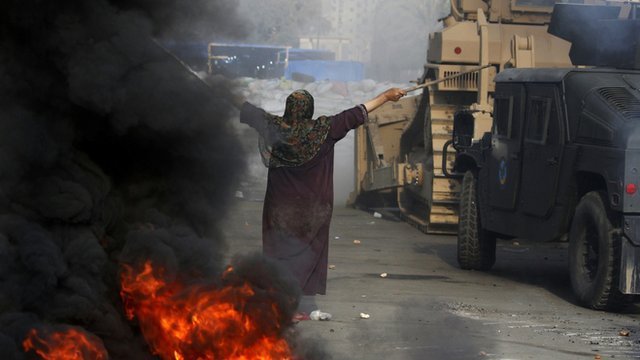
Egypt has declared state of emergency after scores of people were killed when security forces stormed pro-Morsi protest camps in Cairo
The White House condemned the bloodshed, saying it “runs directly counter to the pledges by the interim government to pursue reconciliation”.
UN Secretary General Ban Ki-moon urged “all Egyptians to concentrate their efforts on promoting genuinely inclusive reconciliation”, his spokesman Martin Nesirky said.
There are also reports of unrest elsewhere in Egypt.
- About 35 people have died in clashes in the province of Fayoum, south of Cairo, Reuters news agency says.
- At least five people have been killed in the province of Suez, according to the health ministry.
- Clashes have also been reported in the northern provinces of Alexandria and Beheira, and the central provinces of Assiut and Menya
- Hundreds are said to have gathered outside the governor’s office in Aswan in the south
- State news agency Mena says three churches were attacked, one in the city of Sohag with a large number of Coptic Christian residents
It is still unclear how many casualties were caught up in the two Cairo operations. Figures differ widely and have been impossible to verify independently.
The health ministry has issued an official death toll of 95.
The interior ministry earlier denied any deaths were caused by its forces firing live ammunition.
“Security forces used only tear gas canisters to disperse the protesters though it was heavily fired at by armed elements from inside the two protest camps, causing the death of an officer and a conscript and the injury of four policemen and two conscripts,” the ministry said in a statement.
The government had congratulated the security forces on their operation.
In a televised statement, a government spokesman praised their “self-restraint” and spoke of the “smaller number” of injuries among protesters.
The government would decisively confront attempts to attack state buildings and police stations, he said.
Supporters of Mohamed Morsi have been occupying Nahda Square and the Rabaa al-Adawiya site since he was ousted on July 3. They want him reinstated.
Large plumes of smoke rose over parts of the city as the operation to clear the camps began, with tear gas canisters fired and helicopters hovering above.
Muslim Brotherhood TV called for people to send cars to the sit-ins to take casualties to hospital.
Several Muslim Brotherhood figures have been arrested, security sources said.
There has been strong international reaction to the storming of the camps.
White House spokesman Josh Earnest told a news conference that the administration had repeatedly urged the Egyptian military and security forces to show restraint, and strongly opposed the declaration of a state of emergency.
The European Union called the reports of deaths and injuries “extremely worrying”.
A statement issued on behalf of EU foreign policy chief Catherine Ashton said: “We reiterate that violence won’t lead to any solution and we urge the Egyptian authorities to proceed with utmost restraint.”
Turkish PM Recep Tayyip Erdogan described the result of the camp clearances as a massacre, accused other countries of paving the way for the violence by staying silent, and called for the UN and the Arab League to act immediately.
[youtube zfDd25YXXuw]
Egyptian security forces moved in to clear two protest camps occupied by supporters of deposed president Mohamed Morsi in Cairo killing at least 15 people.
But the Muslim Brotherhood, which backs the protests, put the number of casualties much higher.
Bursts of gunfire were heard and armored bulldozers moved in. Security forces fired tear gas.
Authorities say the Nahda Square camp in western Cairo has been cleared.
The interior ministry said a mopping up operation in the surrounding streets was under way. Pro-Morsi activists were chased into the nearby zoo and Cairo University, Nile TV said.
Witnesses spoke of seeing at least 15 bodies on the ground, but the Muslim Brotherhood, describing the security forces’ intervention as a massacre, put the number of those killed at more than 100.
At least two member of the security forces were among the dead and nine were injured, officials say.
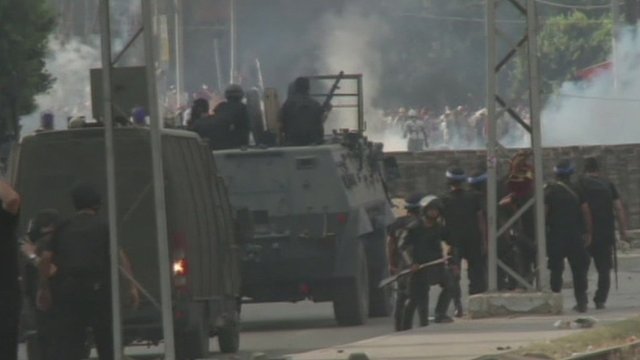
Egyptian security forces moved in to clear two protest camps occupied by supporters of deposed president Mohamed Morsi in Cairo
Supporters of Mohamed Morsi have been occupying Nahda Square and the site outside the Rabaa al-Adawiya mosque in the north-east of the city since he was ousted on 3 July. They want him reinstated.
Earlier, the interior ministry issued a statement saying security forces were taking “necessary measures” against the protest camps.
The statement said a safe exit would be provided for protesters and they would not be pursued, “except those who are wanted by the prosecution”.
The interior ministry is keen “not to shed any Egyptian blood”, the statement went on.
Large plumes of smoke rose over parts of the city as the operation to clear the camps began.
Muslim Brotherhood TV called for people to send cars to the sit-ins to take casualties to hospital.
An armored bulldozer was used to breach brick walls erected by the protesters outside the Rabaa al-Adawiya mosque.
Live firing was heard as the security forces moved in, our correspondent says, and police are now patrolling the nearby streets.
More than 250 people have been killed in clashes with the security forces in the six weeks since Mohamed Morsi’s overthrow.
On Tuesday, one person was killed in a confrontation between supporters and opponents of Mohamed Morsi in Giza after people marched from Nahda Square to a nearby complex of government buildings to protest against the appointment of several military officers as provincial governors.
Egypt’s Foreign Minister Nabil Fahmy said the sit-ins could not continue “endlessly”.
He said the authorities had been trying to seek an agreement through dialogue.
“If the police force take their procedures, they will do that in accordance with the law by court order and in accordance to the basic norms on which these things are done.”
[youtube rsLciJQ57dI]
At least 100 people are reported to have been killed in Egypt’s capital Cairo at a protest held by supporters of ousted President Mohamed Morsi.
Clashes are still taking place around the Rabaa al-Adawiya mosque.
A doctor at a field hospital close to the protest said that in addition to the dead, more than 1,000 were injured.
Both pro- and anti-Morsi supporters had been holding huge protests overnight.
Many thousands occupied Cairo’s Tahrir Square in support of the army, which removed Mohamed Morsi from office earlier this month.
Army chief General Abdel Fattah al-Sisi had urged people to take to the streets to give the military a mandate for its intervention.
It is not yet clear whether the clashes around the mosque represent a concerted effort by the security forces to clear the area.
Early on Saturday, Interior Minister Mohammed Ibrahim had vowed to end the sit-in at the mosque.
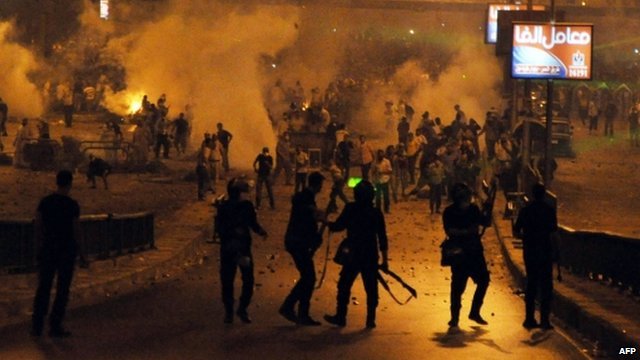
At least 100 people are reported to have been killed in Cairo at a protest held by supporters of Mohamed Morsi
He said local residents had complained about the encampment and that the protest would be “brought to an end soon and in a legal manner”.
The minister said the prosecutor would issue an order, but this has yet to happen.
Muslim Brotherhood spokesman Gehad el-Haddad told Reuters news agency: “They are not shooting to wound, they are shooting to kill.”
A senior Brotherhood politician, Saad el-Hosseini, told the agency that this was an attempt by security forces to clear the mosque area.
“I have been trying to make the youth withdraw for five hours. I can’t. They are saying they have paid with their blood and they do not want to retreat,” he said.
There has also been violence in Egypt’s second city of Alexandria, where at least 10 people have been killed in clashes between rival factions.
Since Mohamed Morsi, the country’s first democratically elected president, was ousted on July 3, dozens of people have died in violent protests.
Mohamed Morsi has now been formally accused of conspiring with the Palestinian militant group Hamas, which governs the Gaza Strip and has strong links with the Muslim Brotherhood.
He is alleged to have plotted attacks on jails in the 2011 uprising that overthrew President Hosni Mubarak.
Mohamed Morsi and several Muslim Brotherhood leaders were freed during a breakout at a Cairo prison in January 2011.
He is to be questioned for an initial 15-day period, a judicial order said.
The order issued on Friday was the first official statement on Mohamed Morsi’s legal status since he was overthrown and placed in custody at an undisclosed location.
[youtube 9tjbEcCAOHs]
Former Egyptian President Mohamed Morsi is being held over allegations of links with Palestinian militants Hamas and plotting attacks on jails in the 2011 uprising, it has been announced.
The ousted president is to be questioned for an initial 15-day period, a judiciary order said.
Mohamed Morsi has been held at an undisclosed location since his removal by the military on July 3.
The announcement comes as supporters and opponents of the deposed president prepare to stage mass rallies in Cairo.
The order issued on Friday is the first official statement on Mohamed Morsi’s judicial status since he was overthrown.
It says the former president is suspected of conspiring with Hamas, which rules the Gaza Strip and has strong links with Mohamed Morsi’s Muslim Brotherhood, during the uprising against former President Hosni Mubarak.
The state-run Mena news agency says Mohamed Morsi is accused of colluding with the Palestinian group to storm police stations and jails, “setting fire to one prison and enabling inmates to flee, including himself, as well as premeditated killing of officers, soldiers and prisoners”.
Mohamed Morsi and several Muslim Brotherhood leaders were freed during a breakout at a Cairo prison in January 2011.
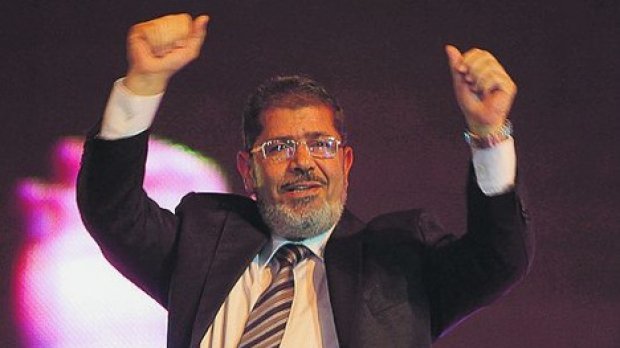
Mohamed Morsi is being held over allegations of links with Palestinian militants Hamas and plotting attacks on jails in the 2011 uprising
A spokesman for the Muslim Brotherhood, Gehad el-Haddad, described the accusations as “ridiculous”. He told Reuters news agency that the order marked the return of the “old regime”.
The army has warned any attempt to use violence during mass rallies planned on Friday will be “dealt with decisively and with force”.
On Wednesday, army chief General Abdel Fattah al-Sisi called on people to take to the streets to give the military a mandate to confront violence and “terrorism”.
Since Mohamed Morsi was ousted, dozens of people have died in clashes between supporters and opponents of the Islamist leader.
Militants have also staged deadly attacks in the Sinai peninsula.
The Tamarod movement that organized protests which preceded Mohamed Morsi’s removal has urged its supporters to take part in Friday’s rallies.
“We call on all of the great Egyptian people to gather in the squares on Friday to officially demand that Mohamed Morsi be put on trial and to support the Egyptian armed forces in its coming war on terrorism,” it said.
Some analysts say the military could be preparing to move against sit-ins by Morsi supporters, including one in front of the Rabaa al-Adawiya mosque in a Cairo suburb.
Mohamed Morsi narrowly won the presidential election in June 2012 to become Egypt’s first democratically elected president, but his opponents accused him of trying to impose an Islamist agenda on the country.
Interim President Adly Mansour has set out a “roadmap” towards a revision of the constitution introduced by Mohamed Morsi and for fresh elections in early 2014, but this has been rejected by the Muslim Brotherhood.
Hisham Qandil, who was prime minister under Mohamed Morsi proposed his own roadmap on Thursday, involving:
- the release of those detained by the army since Mohamed Morsi’s removal
- an independent investigation into the deaths of at least 51 people at the Presidential Guards HQ earlier this month
- a delegation to be allowed to visit Mohamed Morsi to check on his health
- a halt to protest marches, with both sides agreeing to hold rallies only in specific locations
There has been no official response to Hisham Qandil’s suggestions, and military spokesmen have previously given the Muslim Brotherhood a deadline of Saturday to join the official process.
[youtube Y2lDOfy4MFU]
Mohamed Morsi’s family has accused the Egyptian army of abducting him.
The ousted president’s daughter Shaimaa Morsi told a news conference in Cairo that the family was taking legal measures against the army.
Mohamed Morsi has been held at an undisclosed location, without charge, since being ousted from power on July 3.

Mohamed Morsi’s family has accused the Egyptian army of abducting him
The family said it held the military responsible for the former leader’s “safety and security”.
The statement is the first from Mohamed Morsi’s family since he was deposed from office.
“We are taking local and international legal measures against Abdul Fattah al-Sisi, the leader of the bloody military coup, and his putschist group,” Shaimaa Morsi told reporters.
The family was appealing to the International Criminal Court to launch an investigation into the events leading up to his removal from power, she said.
One of Mohamed Morsi’s sons, Osama, said: “What is going on is a violation of human rights and a scandal in every sense of the word.”
He described the manner in which the military were holding Mohamed Morsi as an “abduction”.
The family had had no contact with the former president since he was ousted, he said.
Mohammed al-Damati, a leading Egyptian lawyer and supporter of Mohamed Morsi, said it was a breach of the former president’s human rights to hold him without charge.
Mohamed Morsi’s Muslim Brotherhood movement has refused to recognize the new military-backed administration.
It continues to hold almost daily street protests in Cairo.
Several countries, including the United States, have called for Mohamed Morsi’s release.
But Egypt’s interim authorities insist he is being held in a “safe place”.
A new viral video clip shows Ahmed Ali, an incredibly smart 12-year-old Egyptian boy, excruciating the Muslim Brotherhood and relentlessly dissecting their power grab for Egypt.
The boy in the video shrugs and gesticulates, the familiar words tumbling forth – the constitution, the social objectives of the revolution, the problems of the “fascist theocracy”.
In the background is a sight now equally familiar: a demonstration with people milling around, waving Egyptian flags, engaging in the on-again, off-again struggle to redefine the most-populous Arab country in the way they see fit. In Egypt, whose divisions have in the past week deepened into street fighting between supporters of an elected Islamist government and the military who have deposed them, politics has become part of daily life.
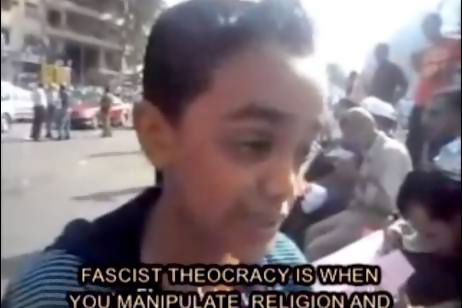
Ahmed Ali, an incredibly smart 12-year-old Egyptian boy, excruciating the Muslim Brotherhood and relentlessly dissecting their power grab for Egypt
For children like this boy, identified in a video uploaded to YouTube by El Wadi newspaper as Ahmed Ali, aged about 12, it also seems to have become part of their upbringing. In the video, which was posted in October last year, Ahmed Ali explains why he has come to the demonstration.
“I’m here to prevent Egypt from becoming a commodity owned by one person and to protest the confiscation of the constitution by a single party,” Ahmed Ali declares.
According to a translation on the pro-secularist website Free Arabs, which posted the video in March, Ahmed Ali dismisses the government, then dominated by Islamist parties, as attempting to “enforce extremist regulations in the name of religion”.
As the world has been mesmerized by Egypt’s metamorphosis in the past two weeks from an Islamist-led democracy to a country where a huge popular movement led to a military decision to depose President Mohamed Morsi, the video has gone viral, with hundreds of thousands watching it. Some commenters are cynical the child could have come up with his analysis on his own, but others seem inspired.
When it was first posted, the comments reflected a divided country. One disapproving viewer said the boy’s mother should, “have some fear of God. I would advise you to teach your child how to defend Islam”. Another was jubilantly supportive: “The president of Egypt in the future, inshallah!”
[youtube tZzp72Is3Yw]
Egypt’s interim government has been sworn in, with army chief General Abdel Fattah al-Sisi, who led the ousting of President Mohamed Morsi, becoming deputy PM as well as defense minister.
Hazem al-Beblawi is the new prime minister, under the interim President Adly Mansour.
The swearing in followed another night of violence between security forces and Mohamed Morsi supporters that left seven dead.
A spokesman for Mohamed Morsi’s Muslim Brotherhood called the interim government “illegitimate”.
Mohamed Morsi was ousted on July 3 in what many have said was a military coup.
The army said it was fulfilling the demands of the people after mass anti-Morsi protests.
The swearing-in ceremony was shown live on state television.
Gen. Abdel Fattah al-Sisi already held the defense portfolio, but now also becomes interim prime minister.
Mohammed Ibrahim, who had been appointed interior minister by Mohamed Morsi, keeps his post.
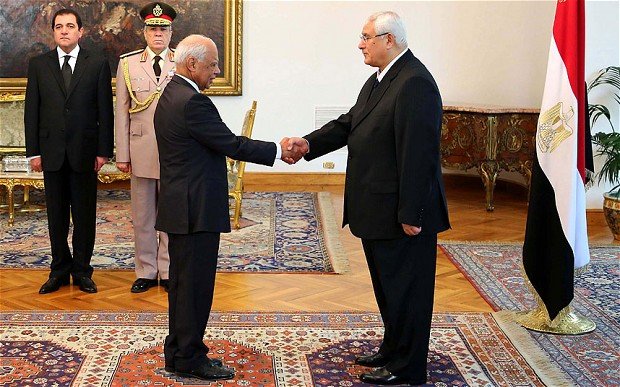
Egypt’s interim government has been sworn in, with army chief General Abdel Fattah al-Sisi becoming deputy PM as well as defense minister
Nabil Fahmy becomes foreign minister and Sherif Ismail is the interim oil minister. Mounir Fakhry Abdel Nour, a Christian, is the interim trade and industry minister.
There are three women ministers, including Maha el-Rabat, who takes the health portfolio.
There were no posts for any figures from Islamist parties in the new government. The Brotherhood had said it would not take part.
Its spokesman, Gehad el-Haddad, told Reuters news agency: “It’s an illegitimate government, an illegitimate prime minister, an illegitimate cabinet. We don’t recognize anyone in it.”
The interim government’s transition plan will see a panel formed by next week which will draw up amendments to the constitution and a timetable for new elections.
The swearing-in ceremony comes amid continuing deadly violence.
More than 400 people were arrested and seven killed in overnight clashes in the capital, Cairo.
The battles erupted after protesters, mostly members of the Muslim Brotherhood, blocked the Sixth of October bridge, a major route over the Nile and through the capital, and the nearby Ramses Square, a transport hub.
Police fired tear gas to try to break up the blockade. Protesters responded by throwing stones. Other clashes broke out in the Giza district, in the south-west.
The head of Egypt’s emergency services, Mohamed Sultan, said two people had died on or around the bridge and five in Giza.
State media quoted health ministry official Khaled al-Khatib as saying that 261 people were injured in the clashes, which lasted into the early hours of Tuesday.
Khaled al-Khatib said 124 people were still in hospital.
Mohamed Sultan said security personnel were among the casualties.
State media later quoted officials as saying 401 people had been arrested for “provoking unrest”.
Members of the Muslim Brotherhood said security forces had used live ammunition, and accused them of attacking a peaceful protest.
On Tuesday, Egypt’s military spokesman, Col. Ahmed Mohamed Ali, denied that the army had used excessive force.
Col. Ahmed Mohamed Ali said the army had handed over its political role to the new interim government, adding: “We are not seeking to rule.”
The clashes came as senior US envoy William Burns visited Egypt.
He met interim leaders but was snubbed by rival groups, including the Muslim Brotherhood.
William Burns described the events of the past two weeks as a “second chance to realize the promise of the revolution” that ended the authoritarian presidency of Hosni Mubarak in 2011.
[youtube yf6HR5MeF2Q]
Seven Egyptian protesters have been killed in Cairo in overnight clashes between security forces and supporters of ousted President Mohamed Morsi.
Police used tear gas to drive back protesters, some hurling rocks, who had blocked a main route in the capital.
The clashes came as senior US envoy William Burns visited Egypt, saying it had been given a “second chance” at democracy.
William Burns met interim leaders but was snubbed by rival groups, including Mohamed Morsi’s Muslim Brotherhood.
Mohamed Morsi was ousted on July 3 in what many have said was a military coup. The army says it was fulfilling the demands of the people after mass anti-Morsi protests.
Monday’s battles erupted after hundreds of protesters, mostly members of Mohamed Morsi’s Muslim Brotherhood Islamist movement, blocked the Sixth of October bridge, a major route over the Nile and through the capital, and the nearby Ramses Square, a transport hub.
Police fired tear gas to try to break up the blockade. Protesters responded by throwing stones. Other clashes broke out in the Giza district, in the south-west.
The head of Egypt’s emergency services, Mohamed Sultan, said two people had died on or around the bridge and five in Giza.
State media quoted health ministry official Khaled al-Khatib as saying 261 people were injured in the clashes, which lasted into the early hours of Tuesday.
Khaled al-Khatib said 124 people were still in hospital.
Mohamed Sultan said security personnel were among the casualties.
Members of the Brotherhood said security forces had used live ammunition, and accused them of attacking a peaceful protest.

Seven Egyptian protesters have been killed in Cairo in overnight clashes between security forces and supporters of ousted President Mohamed Morsi
“We were praying. Suddenly there was shouting. We looked up and the police were on the bridge firing tear gas down on us,” protester Adel Asman told Reuters news agency.
State media later quoted officials as saying 401 people had been arrested for “provoking unrest”.
The latest clashes are the most violent since last week, when more than 50 Morsi supporters were killed in fighting with troops outside the Republican Guard compound, where they believe the former president is being held.
The interim government has since announced its transition plan. A panel is to be formed by next week to draw up amendments to the constitution and a timetable for new elections.
But the Brotherhood has said it will not join a transitional government.
Mohamed Morsi supporters are demanding his reinstatement and have been holding a round-the-clock vigil outside the Rabaa al-Adawiya mosque, in the east of the capital, and at Cairo University in Giza.
Large crowds were again gathered at the mosque on Monday as William Burns, the US deputy secretary of state, visited.
“Get out, Sisi,” some shouted, referring to the head of the armed forces, General Abdel Fattah al-Sisi, who oversaw the overthrow of Mohamed Morsi.
William Burns met interim President Adly Mansour and Prime Minister Hazem al-Beblawi, as well as Gen. Abdel Fattah al-Sisi.
He described the events of the last two weeks as a “second chance to realize the promise of the revolution” that ended the authoritarian presidency of Hosni Mubarak in 2011.
William Burns called on the military to avoid “politically motivated arrests”, saying the US remained committed to an Egypt that was “stable, democratic, inclusive and tolerant”.
But he insisted the US had “not come to lecture anyone. We will not try to impose our model on Egypt.”
The envoy’s comments come amid what correspondents say is an increasing antipathy towards the US among Egyptians on both sides of the political divide.
The US has stopped short of calling the army intervention a coup – doing so would trigger a legal stop of the some $1.5 billion in the mostly military aid it sends to the country each year.
But it has called for Mohamed Morsi to be released. He is being held at an undisclosed location and is being investigated on charges including inciting violence. A number of Brotherhood members have been arrested and warrants have been issued for many more.
William Burns said he planned to meet religious and civilian leaders, the heads of political parties and business figures during his two-day visit.
But both the ultra-conservative Salafi al-Nour party and the Tamarod anti-Morsi protest movement turned down invitations to meet William Burns, while the Muslim Brotherhood also said it had no plans to see him.
“Such kind of visit doesn’t mean anything for us because we believe that America supported this military coup,” said Dina Zakaria, a member of the Brotherhood and its political wing the Freedom and Justice Party.
Islam Hammam, a Tamarod organizer, said the movement had turned down the invitation to talks with William Burns “because the United States did not stand with the Egyptian people from the beginning.”
[youtube WAciDL7DAbk]
Public prosecutor in Egypt has frozen the assets of 14 Islamist leaders, according to judicial sources.
The Muslim Brotherhood head Mohammed Badie and his deputy Khairat al-Shater are reported to be among them.
Mohammed Badie and other Muslim Brotherhood figures are already the subject of arrest warrants, while the ousted President Mohamed Morsi remains in custody.
On Sunday, army chief Abdel Fattah al-Sisi defended the decision to remove him from power.
In a speech, he said he had urged the Islamist president to hold a referendum on his rule days before he was overthrown.
“The response was total rejection,” he added.
Gen Abdel Fattah al-Sisi said no group would be barred from politics: “Every political force… must realize that an opportunity is available for everyone in political life and no ideological movement is prevented from participating.”
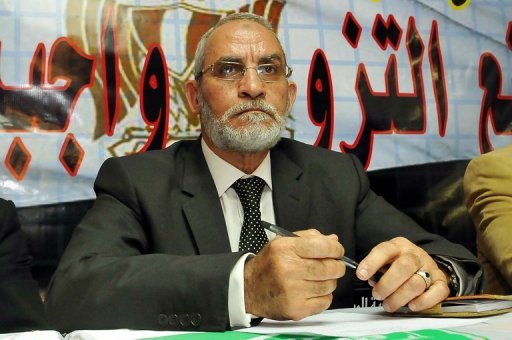
Mohammed Badie and other Muslim Brotherhood figures are already the subject of arrest warrants in Egypt
A temporary government is tasked with leading the country under an army-backed “road map” to restore civilian rule.
The decision by Egypt’s public prosecutor Hisham Barakat to freeze the assets of senior Islamists comes amid an ongoing investigation into deadly clashes that have happened since President Mohamed Morsi was ousted.
Dozens of people have died during major demonstrations by pro- and anti-Morsi protesters in the past two weeks.
According to Egypt’s state-run Channel 1 TV, the leader of the Brotherhood’s Freedom and Justice Party Mohammed Saad al-Katani has also been affected by the asset freeze, along with senior figures in rival Islamist groups.
In the meantime, Egypt’s new interim PM Hazem al-Beblawi has begun appointing people to senior cabinet posts.
Ahmed Galal, a liberal economist with a doctorate from Boston University, is to be finance minister. Nabil Fahmy, a former ambassador to the US, was named foreign minister.
Mohamed Morsi’s supporters, many of them members of the Muslim Brotherhood, have been staging a mass sit-in Cairo since their man was removed from power on July 3.
They are demanding his reinstatement as president and say the military’s removal of him amounted to a coup.
The army says it intervened to remove Mohamed Morsi in response to protests by millions of Egyptians who accused him of becoming increasingly authoritarian and failing to tackle economic difficulties.
[youtube cUavtB2eBMM]
Egypt’s state prosecutor has issued an arrest warrant for Mohamed Badie, the leader of the Muslim Brotherhood, and at least nine other senior figures.
Mohamed Badie is accused of inciting the violence in Cairo on Monday in which more than 50 people were killed.
Many Brotherhood members are already in detention and warrants are said to have been issued for hundreds more.
Meanwhile, a foreign ministry spokesman has said ousted President Mohamed Morsi is being held in a “safe place”.
Badr Abdul Atti told reporters he did not know where the 61 year old was, but that he was being treated in a “very dignified manner”.
“For his own safety and for the safety of the country, it is better to keep him in a safe place. Otherwise, the consequences will be dire,” he added.
Badr Abdul Atti is reported to have denied that Mohamed Morsi was being detained at the Presidential Guard barracks in Cairo, as many believe.
The Muslim Brotherhood, to which he belongs, says his ousting by the military a week ago amounted to a coup.

Muslim Brotherhood leader Mohamed Badie is accused of inciting the violence in Cairo in which more than 50 people were killed
Its supporters have since been staging protests outside the capital’s Rabaa al-Adawiya mosque, not far from the barracks, demanding his release and reinstatement.
The movement’s political wing, the Freedom and Justice Party (FJP), has said it will not accept an offer to join the cabinet being set up by interim Prime Minister Hazem al-Beblawi, a 76-year-old economist and former finance minister who was appointed on Tuesday.
The arrest warrants could scupper any attempts to persuade the Brotherhood to participate in the transitional political process.
Spokesman Gehad el-Haddad said the charges against Mohamed Badie, known as the General Guide, and other senior leaders, were “nothing more than an attempt by the police state to dismantle the Rabaa protest”.
Prosecutors also said they had ordered 200 people – believed to be Brotherhood members – to be held in custody for at least 15 days pending further investigation into accusations of murder, incitement to violence, carrying unlicensed weapons and disrupting public order. Another 450 have been released on bail.
There were conflicting reports about what happened on Monday, with the interim authorities being accused of a cover-up.
The Brotherhood maintains that soldiers carried out a massacre of peaceful demonstrators, who had been taking part in dawn prayers outside the Presidential Guard barracks.
But the police and the military say they acted in self-defence, and had opened fire only after being attacked by armed assailants.
More than 50 Brotherhood supporters were killed, as well as a soldier and two policemen.
[youtube Ewa1F9AQJM0]
Hazem al-Beblawi, Egypt’s newly appointed prime minister, is beginning work on forming a new cabinet, a week after the army ousted President Mohamed Morsi.
Hazem al-Beblawi is expected to offer posts to Mohamed Morsi’s Islamist Muslim Brotherhood, although it has refused to co-operate with what it says it a coup.
The main liberal coalition has said it will not back the plan to hold fresh elections unless amendments are made.
The US said it was “cautiously encouraged” by the move towards reform.

Hazem al-Beblawi is beginning work on forming a new cabinet, a week after the army ousted President Mohamed Morsi
The timetable for new elections was announced by Interim President Adly Mansour on Monday evening, hours after at least 51 people – mostly Muslim Brotherhood members – were killed outside the military barracks in Cairo where Mohamed Morsi’s supporters believe he is in detention.
The decree laid out plans to set up a panel to amend the suspended Islamist-drafted constitution within 15 days.
The changes would then be put to a referendum – to be organized within four months – which would pave the way for parliamentary elections, possibly in early 2014.
Once the new parliament convenes, elections would be called to appoint a new president.
Late on Tuesday Ahmed el-Musalamani, spokesman for the interim president, said talks on a new cabinet would start on Wednesday.
He said posts would be offered to the Brotherhood’s political wing the Freedom and Justice Party (FJP) – which won Egypt’s first free elections in 2012 – and to the ultraconservative Salafist Nour party.
However the proposals were widely rejected by both Islamist and liberal parties.
[youtube KE_wwoyQZFc]
At least 34 Egyptians have been killed in a shooting incident in Cairo, say officials and the Muslim Brotherhood, amid continuing unrest over the removal of President Mohamed Morsi.
The Muslim Brotherhood says its members were fired on while they were holding a sit-in at a Presidential Guard barrack.
But the army said a “terrorist group” had tried to storm the barracks.
Mohamed Morsi, an Islamist and Egypt’s first freely elected president, was ousted by the army last week after mass protests.
Dozens of people have been killed since the unrest began last weekend.
Mohamed Morsi is believed to be held at the Presidential Guard Club, in the eastern Nasr City district of the capital.
His supporters – many of them members of the Muslim Brotherhood movement he comes from – have been staging a sit-in there demanding his reinstatement.
After Monday morning’s violence, the hardline Salafist Nour party – which had supported Mohamed Morsi’s removal – said it was withdrawing from talks to choose an interim prime minister, describing the shooting incident as a “massacre”.
There were conflicting reports from Cairo over how the violence had unravelled in the early hours of Monday morning.
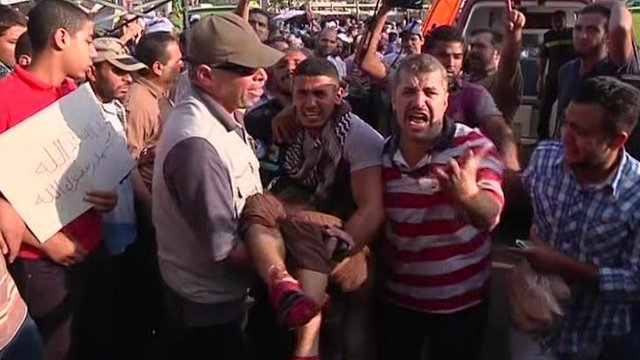
At least 34 Egyptians have been killed in a shooting incident in Cairo amid continuing unrest over the removal of President Mohamed Morsi
The Muslim Brotherhood said the army raided its sit-in at about 04:00 as protesters were performing dawn prayers.
The Freedom and Justice Party, the Brotherhood’s political wing – which took nearly half the seats in last year’s historic election – called on Egyptian’s to stage an “uprising” in response to the incident, against “those trying to steal their revolution with tanks”.
It also urged “the international community and international groups and all the free people of the world to intervene to stop further massacres” and to stop Egypt becoming “a new Syria”.
But in a statement read on state media, the army blamed the shooting on “an armed terrorist group” that had tried to storm the barracks.
It said an army officer was among those killed and that a number of others were wounded, some critically.
The statement said some 200 people had been arrested and were found to have weapons, ammunition and petrol bombs.
TV channels broadcast images of dead and injured people being taken to a makeshift hospital in the Rabaa al-Adawiya mosque, where Brotherhood supporters have been based.
Nour party spokesman Nadder Bakkar said Nour had “decided to withdraw immediately from all negotiations in response to the massacre”.
Though the Islamist party had backed the army-led “roadmap” to new elections, it had been wary of the Muslim Brotherhood becoming isolated.
It had blocked the appointment of two potential prime ministers it thought would not include the movement in the political process.
Mohamed Morsi was replaced on Thursday by Adly Mansour – the head of the Supreme Constitutional Court. He has pledged to hold elections soon, but has as yet given no date for them.
The army has insisted it does not want to remain in power.
On Sunday, tens of thousands of both supporters and opponents of Mohamed Morsi rallied in many Egyptian cities.
[youtube EWmHBZuKKKs]
 Prev123...4Next
Prev123...4Next  Page 2 of 4
Page 2 of 4

























